Providing quality service that makes customers happy doesn’t happen randomly. It’s due to a delicate process of monitoring and improving the systems that provide a service to ensure It’s meeting customer standards and creating value — or, more simply defined, this is service management.
But what exactly does service management consist of? Why is this growing field worth investing resources in? And how can businesses create an efficient service management system with software? In this blog, we’ll cover all you need to know about service management, from its definition to different approaches and benefits. We’ll also explain the advantages of using service management software like monday service to deliver exceptional support faster.
What is service management?
Service management encompasses all the activities companies engage in to deliver high-quality service to customers. It’s the systematic approach of creating, delivering, and improving service-related processes to ensure they provide value to customers.
What is a service?
So, what exactly constitutes a “service?” The ITIL ( Information Technology Infrastructure Library) Practitioner Guidance defines a service as “a means of delivering value to customers by facilitating outcomes customers want to achieve without the ownership of specific costs and risks.”
Essentially, services are the deliverables an organization, system, or individual offers that provide an intangible experience to benefit someone. Services span various industries and contexts, but generally speaking, common types of services emphasized in service management can be summed up into three fields or areas of application.
IT support services
IT Service Management (ITSM) is the most common type of service discussed in service management, but it’s not the only one. This refers to IT Teams and how they use information technology to help users, whether it’s a network issue, hardware maintenance, or setting up a device.
Customer services
Customer services refer to the handling of all issues customers face with software to ensure they’re having a pleasant experience. This includes immediate support for questions a customer may have, resolving complaints, and helping to ensure a customer is properly using a product.
Field services
Field service management (FSM) refers to the technological services provided to customers on-site. These can include installations and maintenance tasks, and a technician is usually sent to perform these services at the customer’s physical location.
HR Service Management
Human resource services management focuses specifically on employee-related services within an organization. This includes optimizing employee requests, automating workflows regarding the employee lifecycle, onboarding, and offboarding employees, and generally enhancing the employee experience.
Enterprise service management
Enterprise service management (ESM) expands ITSM concepts across all departments, such as finance, legal, marketing, and more. It implements the structured processes to enhance all services in an organization.
Service desk management
Service desk management is a typical application of service management that deals with the operations of a service desk to streamline and proactively offer support. A service desk is a centralized hub where employees and customers can request help, report issues, and receive relevant answers to questions — the management of this desk is crucial to creating a connected and consistent service experience.
The best service management software is applicable to all various use cases, including legal, HR, and procurement. monday service empowers any type of service team to deliver exceptional service faster.
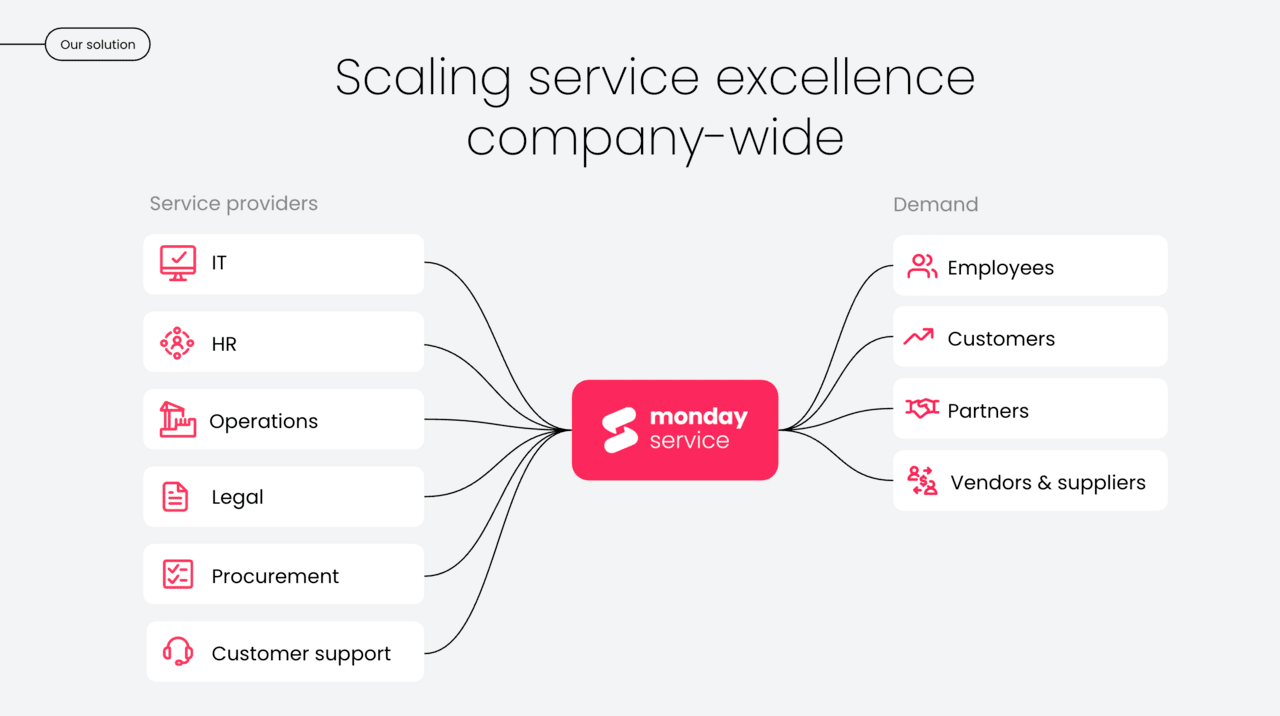
Why is service management important?
By emphasizing high-quality service delivery, service management offers advantages to customers, employees, and businesses. Implementing service management practices among different teams and departments ensures:
Higher customer satisfaction
At its core, service management is simply improving services and optimizing processes for the customer’s benefit. When customers feel they can reliably receive help when needed through a consistent system that addresses their demands, they will be happier. Plus, good service management requires constant reflection on processes and emphasizes customer feedback, leading to products with services built directly from customer input, thus aligning with customer needs.
Efficient, consistent processes
Service management systems force teams to organize and systemize the processes of delivering support. Within these systems, It’s clear who is in charge of what, what exactly needs to be done, and when something needs to be done. Creating and following process protocols makes it easier for employees to get things done, and a consistent experience is provided at every level.
Scalability
Consistent processes to deliver, manage, and improve services are a part of effective customer service systems. With standardized systems in place, it’s easier to scale a company by simply adding new users to the existing systems, so top-notch service can be provided to everybody, no matter how big a company grows.
Top qualities of good service management
As we said, quality service management doesn’t happen randomly. It follows a general set of values and systems that have proven to ensure service is distributed effectively. These qualities include:
- Emphasis on the customer — At its core, service management is about enriching relationships with customers and keeping them happy through exemplary service. The goal is to always focus on the customer’s needs and find creative solutions to keep them satisfied. This includes identifying customer journeys, researching customer needs, and ensuring services provide real customer value.
- Continual improvement — Service management encourages continuous reflection, adjustment, and incorporation of customer feedback to ensure that services continually improve and grow with a business.
- Service lifecycle — Service management frameworks all emphasize the adherence to specific lifecycle phases to ensure value.
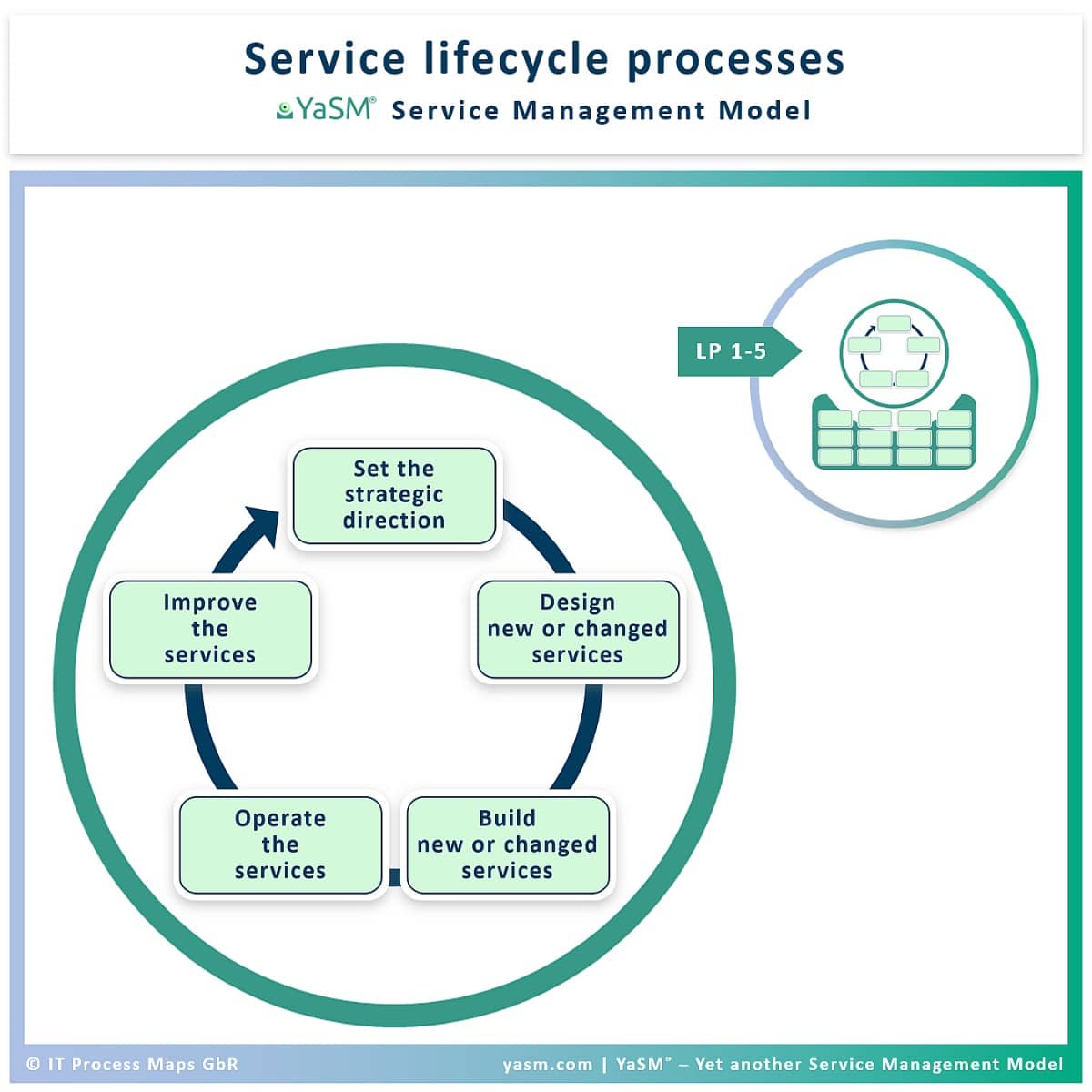
-
- Phase 1: Service strategy – identifying customer and business needs to create clear goals and plans for service.
- Phase 2: Service design – creating workflows and processes to execute these planned services based on predetermined goals.
- Phase 3: Service transition – executing the processes for the first time, making sure it all runs smoothly.
- Phase 4: Service operation – the stage of actually operating the service to ensure it meets user expectations; this includes
- Incident management
- Service request management
- Problem management
- Service continuity management
- Phase 5: Service improvement – using systems and metrics to track the services’ efficiency for optimal impact and continuous service improvement.
What are the benefits of using service management software?
Teams that fully grasp the service lifecycle, providing exceptional service and impact at every level, generally use software to do so. It’s safe to say that software is a necessity for teams to implement if they are serious about providing exceptional service quality. A sound service management system is so beneficial because it:
1. Centralizes information
Service management software stores all service-related information, such as service requests/ tickets, corresponding tasks, and updates, in one accessible place. This reduces the risk of lost tickets or siloed communication and ensures reps have the necessary context to solve issues.
2. Provides Insights to measure success
Service management software stores all service-related information over time, providing teams with metrics, key performance indicators, insights, and valuable trends they can use to make data-backed decisions to improve processes and refine services.
3. Offers visibility & collaboration across departments
Service management software provides at-a-glance visibility into service operations among all teams and departments within an organization. Since any team member can access and interact with the software, real-time communication becomes the norm, and everyone is on the same page. Plus, top software like monday service provides dashboards and reports with real-time data, so various team members with different technical expertise can still gain insight into service progress.
4. Automates processes for enhanced efficiency
Perhaps the best part about using software for service management is that it makes the lives of employees easier by automating and optimizing processes. Advanced service management software automates the entire support ticketing process, automatically assigning tickets, sending relevant notifications, and updating statuses. Not only does this streamline processes, but it saves time and ensures valuable employee resources aren’t being wasted on redundant, manual tasks.

"Our team LOVES the monday service platform and we’re already exploring how we could incorporate it for other departments, too. It has streamlined our workflow in a way that both our team and customers appreciate."
Andrew Marshall | VP Operations
״monday service provides clear insights into requests volume and types, response times, and trends - helping us continuously improve operations"
Grant De Waal-Dubla | CIO"The biggest value for us is speed and flexibility. You can get up and running in days, change anything instantly, and see everything in real time. And you don’t need a dedicated admin to do it."
Clive Camilleri | Head of People Tech & Operationsmonday service: the intuitive software for every service management solution
Built upon the robust monday Work OS, Monday service is the all-in-one service management solution created to enhance any service team’s performance. By combining advanced AI, smart automation, customizable workflows, and seamless cross-team connectivity, monday service is designed to transform how organizations approach service management — all with an impressively easy-to-use interface.
Here are the platform’s top features and capabilities that make monday service such a powerful service management solution across teams from IT, HR, legal, procurement, and more.
Pre-built dashboards to visualize analytics
With pre-built dashboards that visualize service metrics, it’s simple for teams to monitor service operations performance and best leverage data to make smart, data-backed decisions. Gain invaluable insights, get ahead of service trends before they escalate, and easily identify places for continuous improvement.
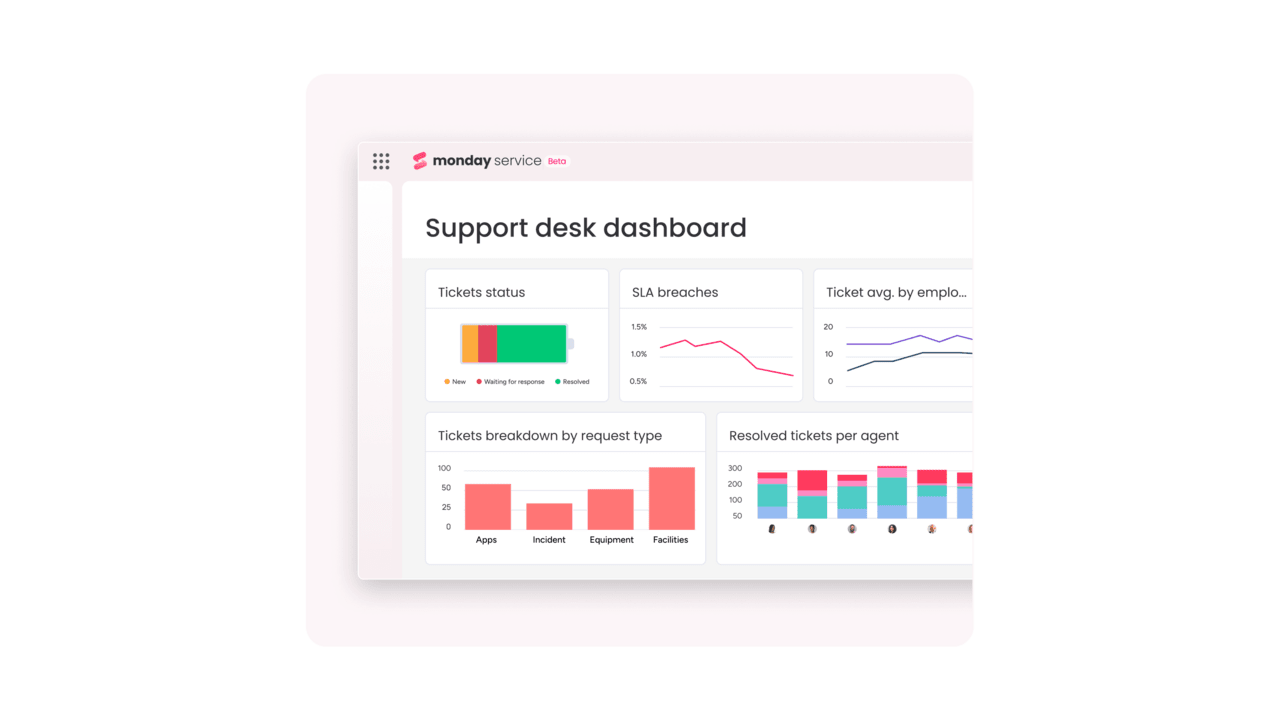
AI columns and automations to accelerate ticket resolution
Enhance agent productivity for faster response times with a fully automated ticketing solution powered by AI. AI automatically populates labels like urgency, issue category, and sentiment when tickets come in to ensure organized ticket prioritization. Smart ticket routing automatically assigned tickets to relevant representatives for a fully automated process with minimal effort.
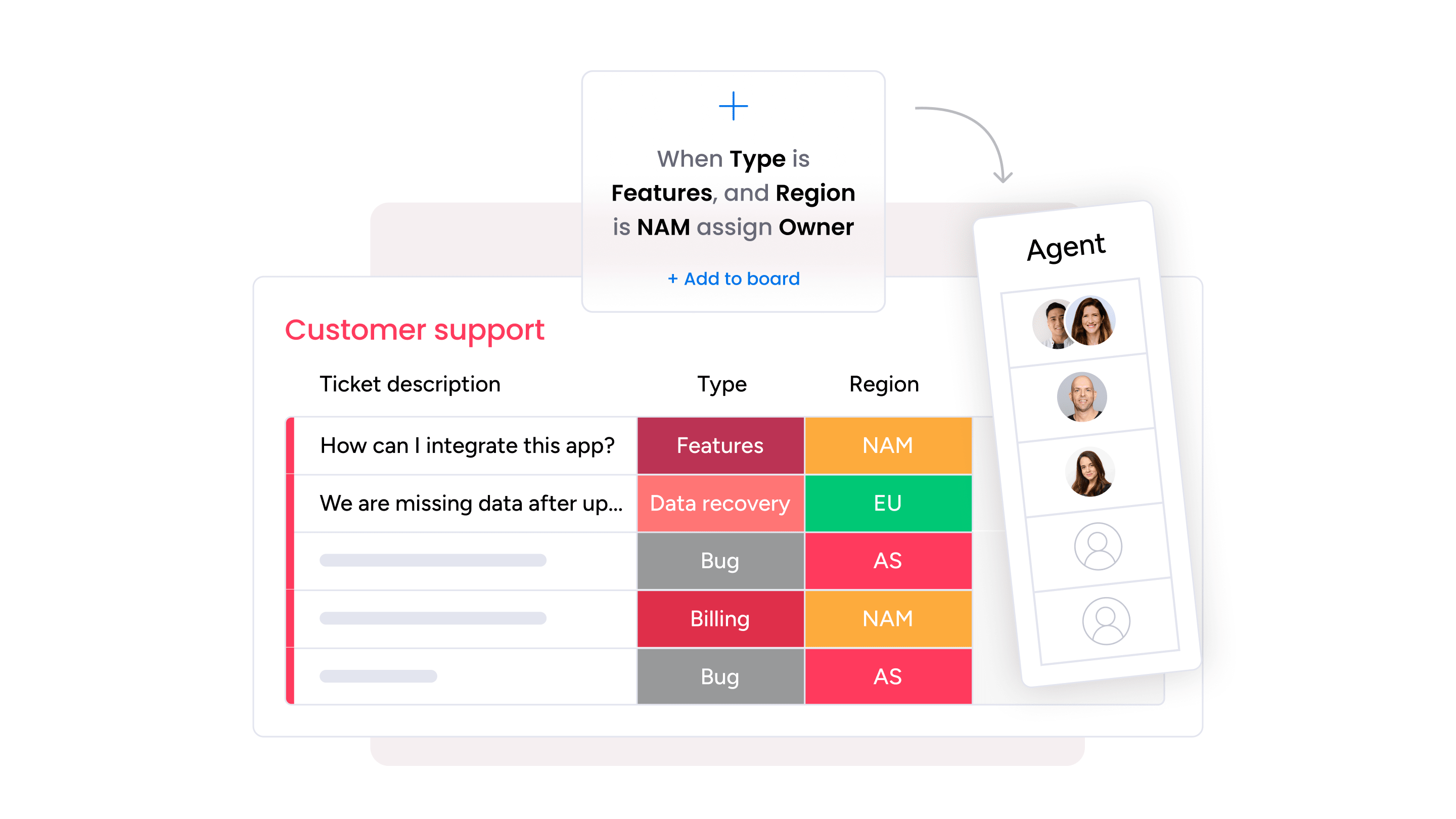
Streamlined communication across departments and stakeholders
Align agents, customers, various departments, and all stakeholders with automated replies and follow-ups. Team members can also easily add notes directly on items or tickets for seamless collaboration or leverage shared templates for quicker communication
Knowledge base assistance for agents
To minimize unnecessary escalation and delays, AI assistance pulls relevant knowledge into a unified knowledge base that agents can easily access. This ensures all agents have the right information in an intuitive knowledge management system and can answer in a timely and consistent fashion.
Automations that empower self-service customer experiences
Customers can independently solve common issues with the power of automated responses and suggested next steps, so agents have more time to focus on the complex tasks at hand.
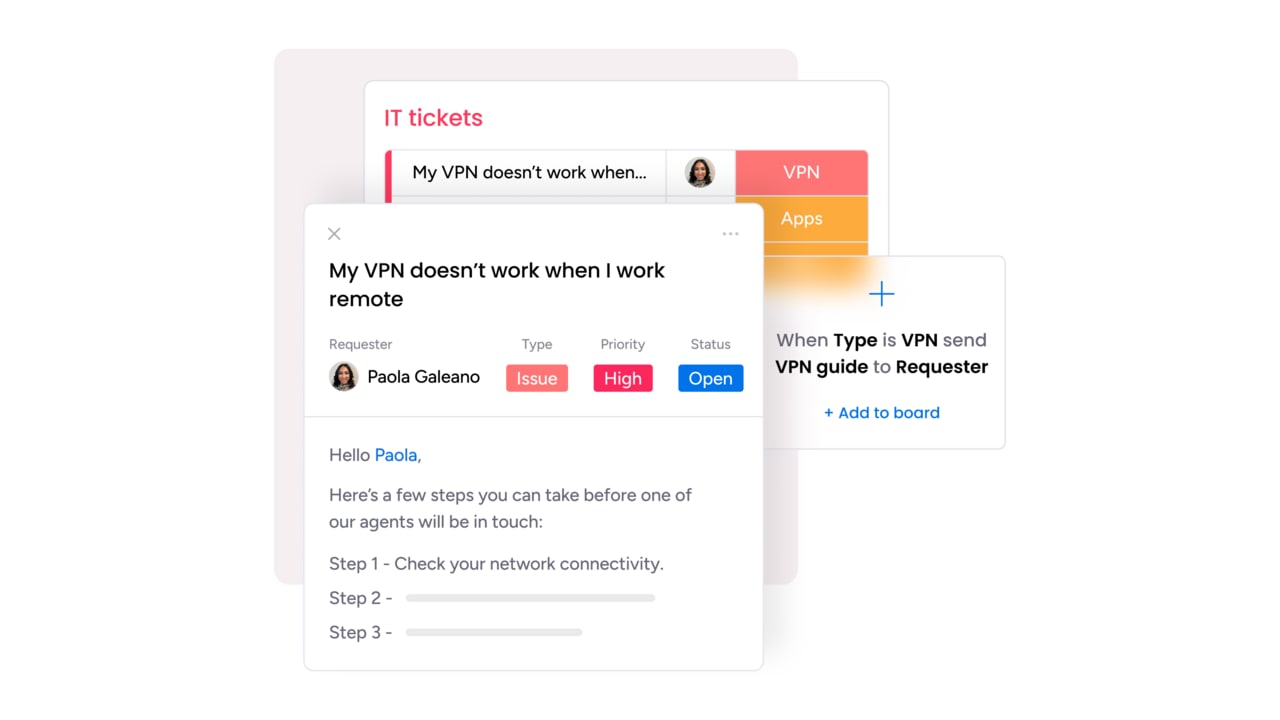
Make service management a central part of your business strategy with monday service
Manage the entire customer lifecycle in one holistic place that connects your service process with organizational resources, whether CRM, employee directory, asset management, or something else. With all the information you need centralized and accessible at the tip of your fingers, manage entire journeys to ensure a consistent, high-quality service experience at every touchpoint
Best of all, monday service is an intuitive no-code platform that doesn’t require any heavy implementation. Instead, our customizable, AI-powered software gives any team the freedom to adapt and scale their service processes in whatever unique way they may need as their business needs evolve. Try it today and transform your service operations from reactive to proactive.
FAQs
What are the service management frameworks?
Service management frameworks are organizations' specific structured approaches/ guidelines to provide optimal services and digital transformation. The most common frameworks include
-ITIL (information technology infrastructure library) for IT service management
-COBIT Control Objectives for Information and Related Technologies for aligning IT with business goals
-ISO/IEC 2000 - the international standard for service management practices
-DevOps to foster collaboration between development and operations teams
-Lean Six Sigma for continual service improvement and waste elimination
What is service management in ITIL?
ITIL (Information Technology Infrastructure Library) is a common service management framework that focuses on aligning business goals with information technology services in one cohesive service management system. Services such as incident management, change management, configuration management, and service desk operations fall under the ITIL 4 framework.
What is service level management?
Service Level Management, commonly known as SLM, is the process of managing and overseeing service levels to ensure that the services provided meet satisfactory stakeholder/ customer standards & requirements. It focuses on creating Service Level Agreements (SLAs) that document measurable performance targets and set clear expectations for customers and service providers.
What’s the difference between ESM and ITSM?
ITSM (IT Service Management) focuses on managing specific IT services like help desks and incident resolutions. ESM(enterprise service management), on the other hand, applies these service management processes to all organizational functions, including departments like HR, facilities, finance, and customer service.

